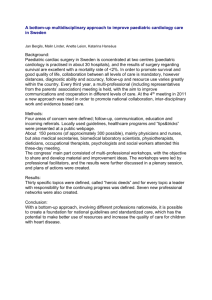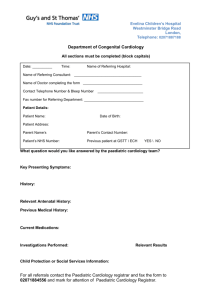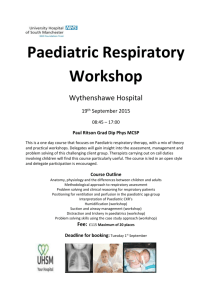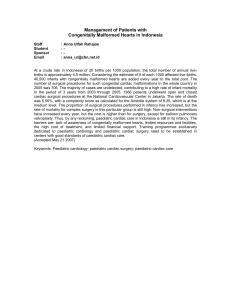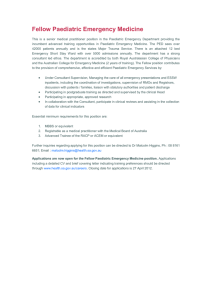Subspeciality Training in Cardiology
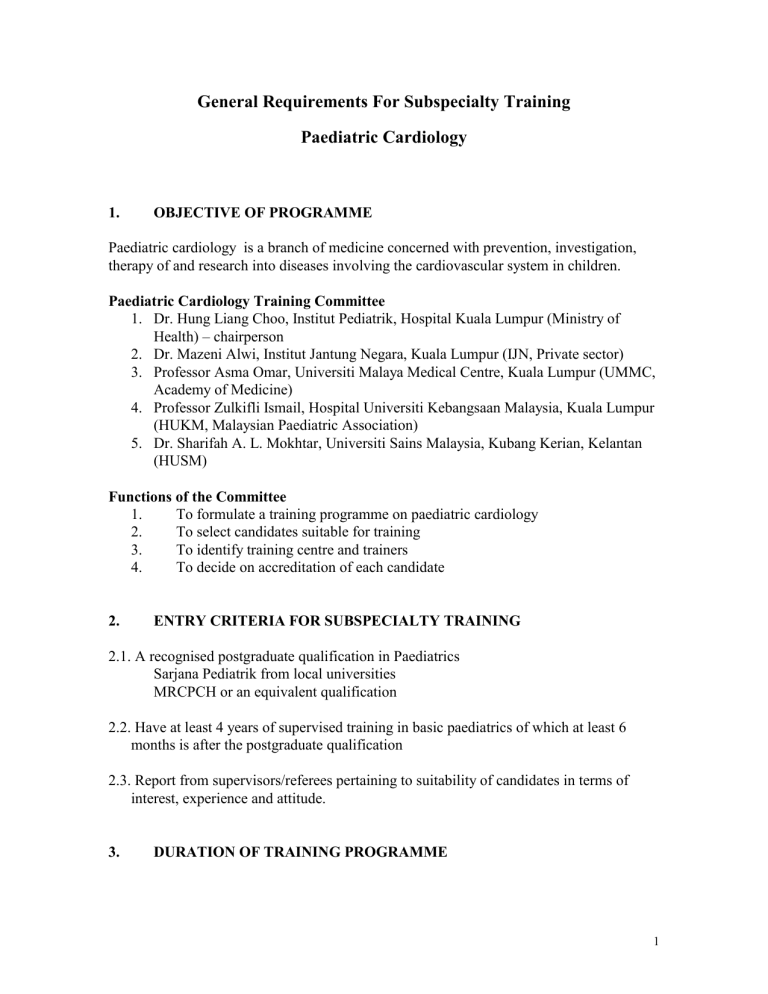
General Requirements For Subspecialty Training
Paediatric Cardiology
1. OBJECTIVE OF PROGRAMME
Paediatric cardiology is a branch of medicine concerned with prevention, investigation, therapy of and research into diseases involving the cardiovascular system in children.
Paediatric Cardiology Training Committee
1.
Dr. Hung Liang Choo, Institut Pediatrik, Hospital Kuala Lumpur (Ministry of
Health) – chairperson
2.
Dr. Mazeni Alwi, Institut Jantung Negara, Kuala Lumpur (IJN, Private sector)
3.
Professor Asma Omar, Universiti Malaya Medical Centre, Kuala Lumpur (UMMC,
Academy of Medicine)
4.
Professor Zulkifli Ismail, Hospital Universiti Kebangsaan Malaysia, Kuala Lumpur
(HUKM, Malaysian Paediatric Association)
5.
Dr. Sharifah A. L. Mokhtar, Universiti Sains Malaysia, Kubang Kerian, Kelantan
(HUSM)
Functions of the Committee
1.
To formulate a training programme on paediatric cardiology
2.
3.
To select candidates suitable for training
To identify training centre and trainers
4.
To decide on accreditation of each candidate
2. ENTRY CRITERIA FOR SUBSPECIALTY TRAINING
2.1. A recognised postgraduate qualification in Paediatrics
3.
Sarjana Pediatrik from local universities
MRCPCH or an equivalent qualification
2.2. Have at least 4 years of supervised training in basic paediatrics of which at least 6 months is after the postgraduate qualification
2.3. Report from supervisors/referees pertaining to suitability of candidates in terms of interest, experience and attitude.
DURATION OF TRAINING PROGRAMME
1
3.1. Advanced Training in Paediatric Cardiology will be for at least 3 years following satisfactory completion of Basic Paediatric Training
3.2. The training will be conducted in accredited training centres locally either in MOH, universities or private sector
3.3. It is encouraged that at least one year, preferably the final year be spent in recognised centre(s) overseas, especially for specialised areas not available in the country
4. CONTENT OF TRAINING PROGRAMME
4.1. Core Training a) Congenital cardiac embryology, anatomy, pathology/physiology b) Electrophysiology of the heart c) Clinical assessment and management of congenital heart disease, acquired heart disease including rheumatic heart disease, Kawasaki disease, cardiomyopathies and vascular disorders.
d) Non invasive techniques
electrocardiography
ECHO/doppler cardiography
interpretation of chest X-ray
exercise testing
familiarity with 24-hour ECG recordings and arrhythmia analysis e) Therapeutic procedures
balloon atrial septostomy
DC cardioversion
pericardiocentesis and drainage f) Invasive investigations
cardiac catheterisation and angiography f) Post operative intensive care g) Adolescent and adult congenital heart disease h) Teaching
4.2. Elective Training may include further core training or one or more of the following: a) Nuclear cardiology b) Electrophysiological investigation and/or radiofrequency ablation for arrhythmias c) Interventional catheter procedures including balloon valvuloplasty, balloon angioplasty, coil embolisation, implantation of ductus/ASD devices d) Fetal echocardiography e) Magnetic resonance imaging f) Cardiac functions by other non-invasive technique eg. tissue doppler imaging, acoustic quantification, stress ECHO.
2
5.
TRAINING CENTRES
5.1.
Training in the subspecialty can only be undertaken in approved posts in accredited training centres (Appendix A).
5.2.
The criteria for accreditation of training centres include:
Training Centre (Year 1) a) An institution or closely affiliated group of facilities providing comprehensive paediatric cardiology care to a population with at least
30,000 live births per year. b) A large enough general hospital catering for at least 100 general paediatric beds if in the same premise and only catering for the centre; if it is a separate centre and catering for the region, then the number of beds it has to cater for will be equivalent c) At least one paediatric cardiologist; should be board-certified in future. d) Able to provide all core training except section 4.1(e) and (f).
Training Centre (Year 2 & 3) a) An institution or closely affiliated group of facilities providing comprehensive paediatric cardiology care to a population with at least
30,000 live births per year. b) Cardiac catheterisation laboratory
Minimum of 100 catheterisation per year. Half of these should be performed in neonates or infants c) Operating room and surgical facilities
At least 100 paediatric cardiac surgical procedures per year (75 with extracorporeal circulation) d) At least two paediatric cardiologists; should be board-certified in future. e) At least two paediatric cardiothoracic surgeons, should be board-certified in future. f) Should be able to provide all core training and some elective training
6. PROGRESSIVE ASSESSMENT
6.1. A log book is kept for the purpose of documenting a breadth of exposure to investigative procedures. The logbook is monitored each year by the supervisor in order to help the candidate plan his/her future training requirements. The logbook will also include details of presentations at meetings, papers published and research projects in which the trainee has been involved.
3
With regard to training in specific areas such as echocardiography and cardiac catheterisation, it should be noted that trainee will be required to provide evidence of the experience which he/she has acquired. Such evidence should include a log of all echocardiographic examinations performed, cardiac catheter procedures carried out, and other interventional procedures (eg balloon septostomy).
6.2. Echocardiography Experience a) A period of study of the physics of echocardiography and its applications in crosssectional, M-mode and doppler studies b) Familiarity with the special views used in paediatric echocardiography, particularly subxiphoid, suprasternal and right and left parasternal views c) At least 300 echocardiography studies (at least 250 with congenital or acquired heart disease) should be performed in conjunction with and under the supervision of a paediatric cardiologist/echocardiographer in 3 years. d) Completion of 300 self conducted paediatric echocardiography studies (at least 250 with congenital or acquired heart disease), with the production of a provisional report, which will have been checked by a paediatric cardiologist/echocardiographer in 3 years
These recommendations are part of the current Standards of Practice in Paediatric
Echocardiography recommendations
6.3. Cardiac Catheterisation d) Trainees are expected to perform a minimum of 100 cardiac catheter procedures, of which at least 20 should have been as the primary operator. Trainees should have experience of right heart catheterisation, left heart catheterisation, and should have assisted at interventional procedures including balloon dilation of pulmonary valve e) stenosis and balloon dilatation of recoarctation/coarctation of the aorta
In addition trainees should have carried out balloon atrial septostomy (either under fluoroscopy or echocardiographic control)
6.4.
After completing two years of basic training locally, trainees will have one year of advanced training overseas. This involves all core training and additional training in a special area such as interventional cardiology, electrophysiology, fetal echocardiography.
6.5.
It is advisable that trainees have a further period of training of variable duration (1-
2 years or sometimes longer), which may involve a period of dedicated research leading to a higher degree (eg MD, PhD) This supplementary training may also involve additional training in a special area such as electrophysiology, fetal cardiology, nuclear and magnetic resonance imaging.
4
7. EXIT CERTIFICATION
7.1.
On satisfactory completion of the training period, the trainee shall apply to be exit certified. The trainee must provide evidence and demonstrate his/her competency to justify certification in the Subspecialty.
7.2.
In future, the specialty shall establish a Board of Assessors for certifying completion of training. In considering such applications, the Board will be guided by the assessment reports from the annual reviews, logbook, clinical workload and other clinical activities. The candidate may be required to undergo a viva voce as part of the end of the training assessment.
The above criteria will be reviewed from time to time.
Prepared by
Dr. Hung Liang Choo
Institut Pediatrik
Hospital Kuala Lumpur
Feb 2002
5
Appendix A
ACCREDITED TRAINING CENTERS AND TRAINERS
YEAR 1
Hospital Kuala Lumpur
Dr. Hung Liang Choo
Dr. Rosalie Yip CW (UPM)
Hospital Pulau Pinang
Dr. Hasanah Ishak
HUKM
Prof. Dr. Zulkifli Ismail
Assoc. Prof. Dr. Bilkis Abd. Aziz
HUSM
Dr. Sharifah A L Mokhtar
UMMC
Prof. Dr. Asma Omar
Dr. Zarin Zan
YEAR 2
Institut Jantung Negara
Dr. Mazeni Alwi
Dr. Hasri Samion
Dr. Haifa Abd. Latif
Dr. Geetha Kandavello
YEAR 3
Overseas
6

